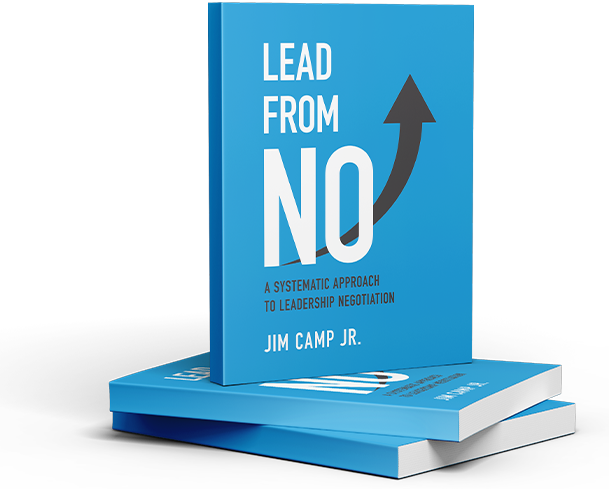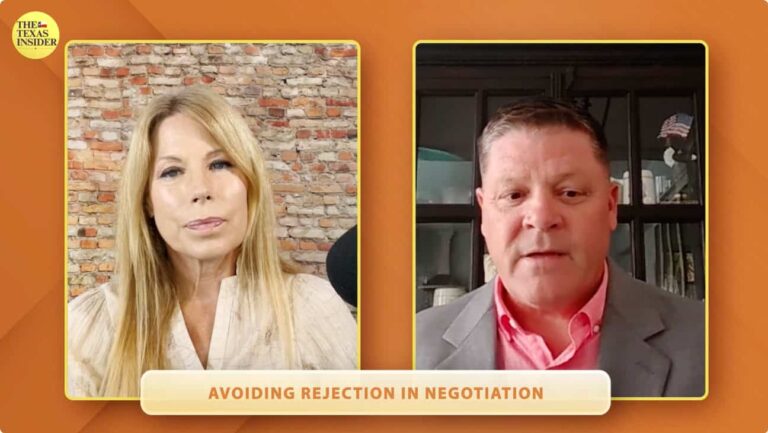Negotiation is about taking responsibility to make decisions. You are in a negotiation when:
- You are asking someone to make a decision, or
- You are communicating a decision you made to another person or party.
We are inclined to say Yes
Unfortunately, many people from every walk of life are only comfortable asking for decisions or confirming decisions when the answer is affirmative or when Yes is communicated.
They fear the one clear decision that everyone understands.
They are afraid to hear or say the word “No.”
- Sometimes they avoid saying No because they don’t want to hurt any feelings or damage a relationship.
- Or they don’t like to hear No because they think that they are receiving criticism, and they (or their ideas) are being personally rejected.
Sometimes, the word No means more work for everyone now, so they throw out a false Yes, which means more work later.
They don’t realize that:
When you are afraid to hear or say the word No in a negotiation, you eliminate the safest and most understood decision in your negotiation toolkit.
Decisions of the Disgruntled Guest
Do you know a person like this? They accept an invitation to an event but don’t have a good time. The event could be a work event, family gathering, or social celebration.
Afterward, the guest complains to anyone about every detail of the event.
In the guest’s eyes, their poor experience was the result of other people’s poor decisions.
Let’s take a closer look.
Meet Tray
We’ll name our disgruntled guest Tray. Tray received an invitation and rsvp’d with a Yes. He went to the event, and the next day, he told his friends that the event was subpar, the cheap host made him pay for his drinks, it was too hot outside, and the food wasn’t up to par.
So, who is responsible for Tray’s horrid time at the event? Right now, Tray is pointing the finger at the host.
First, we must realize that Tray’s attendance was a negotiation because Tray was asked to make a decision.
Tray’s poor experience resulted from a series of his poor decisions because he did not have a valid Negotiation Purpose. (In the Camp System, a Negotiation Purpose is an update of our Mission and Purpose.)
The definition of Negotiation Purpose is to create agreements that (1) solve the pain of your respected opponent or help them realize an opportunity, (2) under conditions that are acceptable to you.
Tray did not know what would be provided to him at the event and that he should accept the invitation under conditions that were acceptable to him.
If you follow Tray’s decision path, you can apply this to many small and large problems faced every day.
Bad Decision 1
On the rsvp, Tray checked the box, “Yes, I will attend.” But Tray was not clear and honest with himself when he accepted the invitation. What were the problems and opportunities that Tray needed to identify and solve before he could confidently make a decision to accept or reject the invitation?
Was he going because he cared about the host and wanted to delight them by participating in this event? Was he seeing the other person’s point of view? Going back to our negotiation purpose, this is “solving the pain or realizing the opportunity of the other party.” (1)
Or was he looking to be fed and entertained? In the Negotiation Purpose, this is “under conditions that are acceptable to you.” (2)
We are not judging Tray but pointing out that he did not identify what was important to him before he decided to attend. Tray’s first poor decision was not to identify and solve the problems that were important to him.
Bad Decision 2
At the event, Tray was unhappy that everything was outside in 95-degree heat. He was sweating in his suit and didn’t expect to pay for the drinks he needed to keep cool. Also, he was not happy because this was a formal sit-down dinner, and he would have preferred a buffet so he could mingle and fill his plate with his favorite food.
He didn’t leave before the event ended because he was afraid to say No to the people there. For Tray, feeling overheated, underfed, and upset about the bar was less important than his fear of criticism.
So, Tray stayed until the end, and his list of complaints grew.
Tray’s second poor decision was to stay at the event because he feared what others might think if he left.
The truth is that you don’t know what other people think, but you do know what you think.
So why trust someone else’s judgment before trusting your own?
Bad Decision 3
The next day, Tray blamed others for his bad experience as he complained to everyone. He put down the host and spoke negatively about the event. This is not just about Tray avoiding gossip. Rather, it is about taking responsibility for the decisions he made.
Must You Stay Committed to a Bad Decision?
Let’s remember that one poor decision is reversible. Don’t be afraid to make a bad decision.
Going back to the invitation, Tray had an expectation of what he wanted from the event but did not validate what was planned for the occasion. He did not take the time to ask a few questions that may have given him an insight into the venue, food, or entertainment.
His negative vision of the event was a result of his laziness. Tray neglected to ask questions to confirm that his needs would be met before he decided to attend. Ultimately, it was not the responsibility of the organizer, caterer, or host to organize to meet Tray’s requirements.
If Tray had first identified what was important to him and then sought to learn if his needs would be met at the event, he could have prevented his bad experience with a few questions.
Perhaps Tray was afraid of politely rejecting the invitation because he feared how the host and others might interpret his response. If this was true, then Tray’s fear of rejection is why he went to the event.
After all, the truth is that Tray does not know what others might think of him for not attending the event.
It would have been ok for Tray to reject the invitation politely. He should not have gone if he didn’t like the answers to the questions he asked or felt there wasn’t enough negotiation budget in him (time, money, energy, and emotion.)
If he had made a bad decision to go to the event, he could have left early.
Otherwise, he could have accepted his decision to attend the event and stay until the end without criticizing the host.
Let’s Flip It and Take Responsibility
In this case, the first No is the hardest. Let’s back up and say that Tray gets the invitation and calls the place where the event will be. He finds out it is outside and responds No.
What could the host say after receiving an rsvp of No?
- “I didn’t want Tray to come anyway,” That’s good for Tray; why should he go if the host doesn’t want him? (Perhaps the host didn’t say No enough when deciding whom to invite.)
- “That’s too bad. It would have been nice to see Tray.” (Tray didn’t damage a relationship, and the host might even reach out to him and ask if everything is Ok.)
- The host is angry and says, “It’s outrageous that they aren’t coming!” and says terrible things about Tray to everyone.
The fact is, you have no idea what the host’s reaction will be. If their response is #1 or #2, there are no repercussions. As mature negotiators, hosts should not take No as a personal rejection. In this case, 2/3 of the time, Tray saying No would not affect anyone.
The only potential bad response of the host is #3. If their response is 3, and you think their anger is justified or will ruin your life, you can always change your mind and attend the event.
Decisions can be changed.
Remember that if you never say No, you’ll never know.
Practice:
When was the last time you said No?
- What was the pain or opportunity of the other party?
- Under what conditions would you have said yes?
Let’s look at Camp’s “4 Reasons Why People Say No” and determine why you said No.
Which of these apply to you?
- You didn’t see the vision of the benefit you’d gain with a Yes.
- You lacked the data that’s necessary to support a Yes.
- You didn’t have the authority to say Yes or No.
- You were using No as a tactic or bluff. (We don’t teach Camp clients to do this.)
The next time you are asked to make a decision, practice your negotiation skills by going through this list instead of quickly responding with a Yes or a No. Memorize the words Vision, Data, Authority, and Bluff. Then, you’ll be ready to take responsibility for your decisions. The more you practice, the easier it will be.
If you prefer personal coaching to learn and apply the Camp System to your complex business negotiations,
find out more here.
Agreement (1)
All Posts (26)
Building Vision (4)
Compromise (1)
Decision Making (8)
Influence (1)
Mission and Purpose (4)
Motivate (1)
Questions (3)





